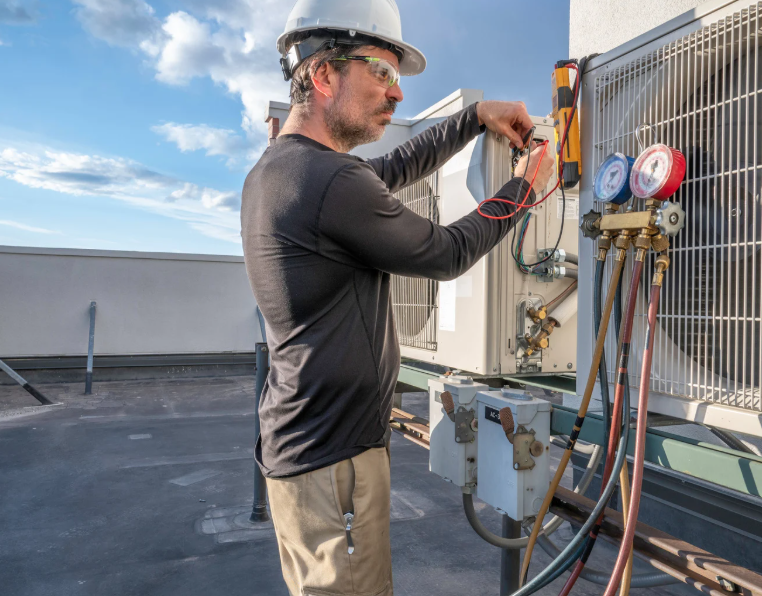Energy consumption in urban environments is a key focus for commercial and residential building managers seeking to achieve sustainability and cost reduction. In Toronto, where heating and cooling demands fluctuate sharply throughout the year, advanced heat recovery solutions integrated in HVAC systems now play a pivotal role in smarter energy use.
Daisy Energy, a leader in Ontario’s energy efficiency sector, offers state-of-the-art HVAC retrofits and optimization strategies that help curb environmental impact while improving operational reliability.
Heat Recovery in HVAC Technology Basics
Heat recovery refers to the process of capturing waste heat from one part of a building’s system and repurposing it for another activity, such as pre-heating water or supplementing space heating.
Modern HVAC systems use heat exchangers and compressor-less designs, enabling the transfer of thermal energy without additional electricity draw. By tapping into sources such as exhaust air or facility-generated waste heat, these systems reduce the need for energy-intensive heating and cooling cycles.
Daisy Energy’s Energy Cubed (E3) HVAC solution takes this principle further, employing water as a refrigerant and using solar thermal energy or recovered heat to drive both heating and cooling functions.
The technology delivers up to 30 times higher efficiency than traditional compressor-driven HVAC systems, simultaneously eliminating synthetic refrigerants linked to greenhouse gas emissions.
Measurable Reductions in Energy Costs and Carbon Footprint
HVAC systems traditionally account for nearly half of total energy use in commercial buildings. Daisy Energy’s heat recovery systems not only reduce operational costs but also allow for participation in green building incentive programs, further accelerating payback through rebates and funding. Even modest upgrades, such as installing energy recovery ventilators (ERVs) or heat recovery ventilators (HRVs), consistently yield 15–20% reductions in utility bills.
Sustainability and Grid Stability Benefits
Beyond direct energy savings, heat recovery HVAC systems deliver substantial environmental value. By leveraging building-generated renewable or waste heat, Daisy Energy systems help reduce annual greenhouse gas emissions associated with building operations by approximately 25–40%. The compressor-less, water-based refrigerant architecture significantly improves air quality and aligns with LEED certification standards.
Moreover, in Toronto’s grid-intensive winters, decentralized heat recovery supports overall grid stability by flattening peak load profiles. Facilities that deploy Daisy Energy optimization tools can monitor energy usage in real time with circuit-level metering, identifying opportunities for further sustainability improvements and demand response participation.
Integration with LED, Solar, and EV Infrastructure
Daisy Energy’s approach is holistic. Its heat recovery solutions work in tandem with LED lighting retrofits, solar light poles, and electric vehicle (EV) charging stations. LED retrofits alone have yielded up to 85% reductions in lighting energy use, while smart controls extend similar cost-cutting benefits to HVAC and other building systems.
For clients pursuing whole-building sustainability, linking advanced HVAC systems to solar energy sources further integrates clean power with smart load management. EV chargers installed in Daisy Energy-optimized facilities take advantage of recovered heat and free cooling loads, reducing the overall grid demand and supporting the transition to electric mobility.
Project Delivery, Incentives, and Real-World Results
Daisy Energy’s turnkey services encompass energy audits, incentive navigation, engineering, installation, and monitoring. Clients benefit from tailored financing options and streamlined applications for government or utility rebates, removing capital barriers that have traditionally slowed market adoption.
Next-Generation Solutions in HVAC Toronto
Toronto continues leading North America in sustainable building retrofits, with Daisy Energy playing a key advocacy and delivery role. Its tri-generation and compressor-less HVAC systems set the standard for smart energy use, synthesizing heat recovery, LED efficiency, solar integration, and EV infrastructure in one coherent package. Verified project metrics confirm sustained reductions in energy costs, improved comfort, and enhanced grid resilience.
Smart energy solutions like those championed by Daisy Energy are integral to the future of HVAC Toronto facilities, setting a new benchmark for climate action and sustainability through intelligent heat recovery.




































